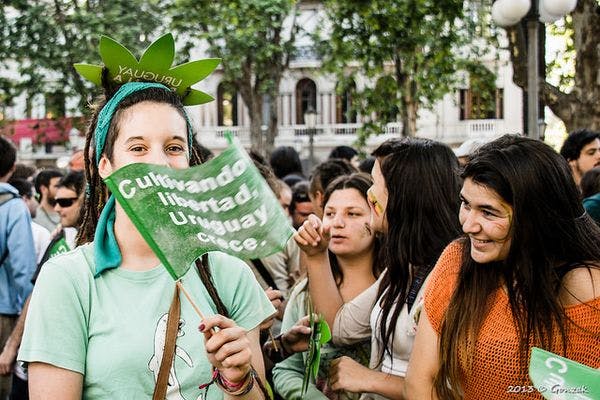Flickr CC Gonzalo G. Useta
Qu'est-il arrivé aux réformes progressives sur les drogues en Amérique Latine?
Malgré un mouvement dans la bonne direction, la plupart des réformes ont été trop timides pour avoir un réel impact. Plus d'informations, en Anglais, sont disponibles ci-dessous. By Lidia Hernández-Tapia
This article is adapted from AQ's latest issue on reducing homicide in Latin America.
Considering the drug trade’s role in fueling violence throughout Latin America and the Caribbean, it’s worth examining the impact of recent drug policy changes. Most involve the decriminalization of marijuana for personal use or the legalization of medical marijuana — often in the form of oil derived from the cannabis plant that can be taken orally as medicine. Most reforms have been too minimal to affect crime. In some cases, bureaucracy and poor implementation may have thwarted the intended positive effects.
Argentina
The Senate passed a law approving medical marijuana in 2016. The government regulates the prescription and distribution of medical marijuana products, which must be imported since production is still illegal.
Impact: Patients say the implementation of the medicinal policy has largely failed. Cannabis oil is only accessible to patients with refractory epilepsy, and patients remain unauthorized to grow their own cannabis. Meanwhile, further drug liberalization seems unlikely under President Mauricio Macri, who has scaled up efforts against trafficking. Macri’s approach includes a controversial expansion of the armed forces’ role in stemming the drug trade.
Bolivia
Bolivian farmers have chewed coca leaves for generations to ward off altitude sickness and as a mild stimulant. However, coca cultivation was largely illegal until 2004, when the government began working with coca farmers to regulate cultivation, setting limits to grow the leaf in certain regions. In 2009, a new constitution backed by President Evo Morales, a former coca farmer, described it as part of the country’s cultural heritage. In 2017, a new law increased the legal limit of coca cultivation to approximately 55,000 acres from 30,000 acres, to incentivize more farmers to grow it legally.
Impact: The 2004 reform was followed by a fall in the share of Bolivia’s prisoners behind bars for drug-related convictions, from 41 percent in 2004 to under 20 percent in 2016. After the new constitution, coca cultivation also fell over time, reaching a peak of 76,600 acres in 2010 and then falling to just under 50,000 acres in 2015.
(...)
